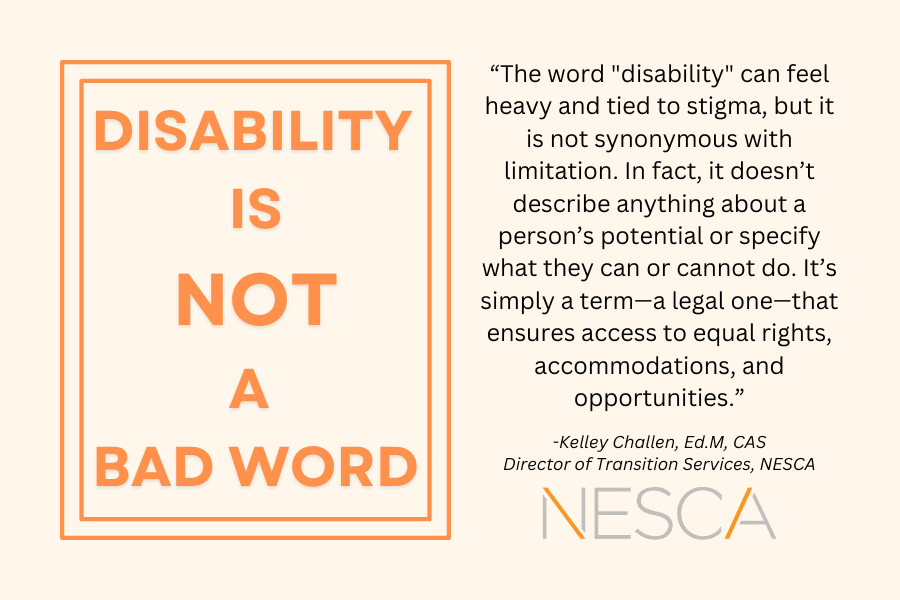
 By: Kelley Challen, Ed.M., CAS
By: Kelley Challen, Ed.M., CAS
Director of Transition Services, NESCA
I recently listened to a podcast where the host shared that she avoids using the term “disability” because she doesn’t want her child to feel limited.
This really made me think. The word “disability” can feel heavy and tied to stigma, but it is not synonymous with limitation. In fact, it doesn’t describe anything about a person’s potential or specify what they can or cannot do. It’s simply a term—a legal one—that ensures access to equal rights, accommodations, and opportunities.
Yes, people with disabilities might use tools, supports, or accommodations to learn, work, and navigate the world. But needing those supports isn’t a limitation—it’s about finding ways to thrive and share unique strengths and abilities.
As a parent and professional who does not identify as disabled, I believe it’s essential to reflect on our own feelings and biases about the word “disability.” If we avoid using it because it makes us uncomfortable, how might that impact our children as they grow and learn to advocate for themselves?
When we don’t teach kids to understand and embrace the term “disability,” we might unintentionally limit their access to the tools, rights, and opportunities they deserve to realize their potential. Additionally, if we avoid using the term “disability” or reframe it when we hear it, we implicitly teach our children that it’s a “dirty word” and possibly associate it with shame.
Understanding disability as a legal term is particularly important because many critical services and protections are only available to those who identify as having a disability. These include:
- Individualized Education Programs (IEPs) and 504 Plans, which provide accommodations and support in school settings.
- Standardized testing accommodations, such as extended time, alternative test formats, or assistive technology for standardized exams like the SAT, ACT, and college entrance tests.
- Vocational Rehabilitation Services, which offer career counseling, job training, and workplace accommodations.
- Social Security Disability Benefits (SSI/SSDI), which provide financial assistance to eligible individuals with disabilities.
- College disability support services, which can include priority registration, note-taking assistance, alternative testing arrangements, and more.
- Workplace accommodations under the Americans with Disabilities Act (ADA), such as modified work schedules, assistive technology, or accessible office spaces.
- Access to independent living programs and community supports that help individuals with disabilities navigate housing, transportation, and daily living needs.
We can’t break down stigma if we’re afraid to name it. Let’s change the narrative: Disability is just a term, not a measure of someone’s potential.
About the Author
Kelley Challen, Ed.M., CAS, is an expert transition specialist and national speaker with over 20 years of experience supporting youth and young adults with diverse developmental and learning abilities. Since 2013, she has served as Director of Transition Services at NESCA, offering individualized transition assessments, planning, consultation, coaching, and program development. She specializes in working with students with complex profiles who may not engage with traditional testing tools or programs. Ms. Challen holds a BA in Psychology and a Minor in Hispanic Studies from The College of William and Mary, along with a Master’s and Certificate of Advanced Graduate Study in Risk and Prevention Counseling from the Harvard Graduate School of Education. She is a member of CEC, DCDT, and COPAA, believing it’s vital for all IEP participants to have accurate information about transition planning. Ms. Challen has also been actively involved in the MA DESE IEP Improvement Project, mentored candidates in UMass Boston’s Transition Leadership Program, and co-authored a chapter in Technology Tools for Students with Autism.
young adults with diverse developmental and learning abilities. Since 2013, she has served as Director of Transition Services at NESCA, offering individualized transition assessments, planning, consultation, coaching, and program development. She specializes in working with students with complex profiles who may not engage with traditional testing tools or programs. Ms. Challen holds a BA in Psychology and a Minor in Hispanic Studies from The College of William and Mary, along with a Master’s and Certificate of Advanced Graduate Study in Risk and Prevention Counseling from the Harvard Graduate School of Education. She is a member of CEC, DCDT, and COPAA, believing it’s vital for all IEP participants to have accurate information about transition planning. Ms. Challen has also been actively involved in the MA DESE IEP Improvement Project, mentored candidates in UMass Boston’s Transition Leadership Program, and co-authored a chapter in Technology Tools for Students with Autism.
To schedule an appointment with one of NESCA’s transition specialists, please complete our online intake form.
NESCA is a pediatric neuropsychology practice and integrative treatment center with offices in Newton, Plainville, and Hingham, Massachusetts; Londonderry, New Hampshire; the greater Burlington, Vermont region; and Brooklyn, NY (coaching services only) serving clients from infancy through young adulthood and their families. For more information, please email info@nesca-newton.com or call 617-658-9800.

